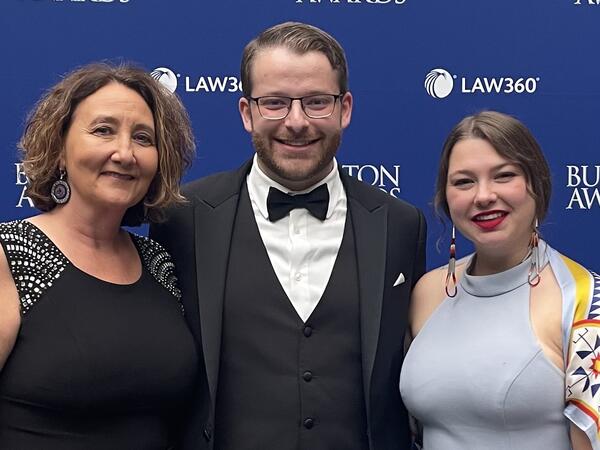
ASU Law students win national legal writing awards
Two recent graduates of the Sandra Day O’Connor College of Law at Arizona State University have been honored with awards for their impressive legal writing skills.
Noah Goldenberg was one of 25 recipients of the Law360 Distinguished Legal Writing Award – Law School from the Burton Awards for his article “Indian Embryos as ‘Indian Children?’” He was honored at a ceremony on June 12, 2023, at the National Portrait Gallery in Washington, D.C., which he attended with his wife and Willard H. Pedrick Dean and Regents Professor of Law Stacy Leeds. The paper was initially published in the Winter 2022 edition of the Arizona State Law Journal.
Claire Newfeld won The Scribes Law-Review Award for her paper “Indian Boarding School Deaths and the Federal Tort Claims Act: A Route to a Remedy.” The review committee picks winners based on criteria such as the quality of writing, research, footnotes and topic choice.
Both Goldenberg and Newfeld graduated in May 2023 with their Juris Doctor degrees and were students in ASU Law’s Indian Legal Program.
“It’s a nice thing for the school and me,” said Goldenberg. “I cared about the paper but you don’t write to get the award. It’s very nice to receive it after all of that hard work.”
Goldenberg, a descendant of the Lower Sioux Indian Community, came to law school to help tribal nations. That drive shines through in his timely paper topic, which deals with the Indian Child Welfare Act and how it should apply to laws around in vitro fertilization. The first IVF baby was conceived the same year ICWA was enacted; the U.S. Supreme Court just upheld the 1978 law during its recent session.
“The paper argues that the best move is to treat embryos like property like a lot of states do,” he said. “If you’re trying to make super early determinations on parental rights over embryos, you can’t pick and choose which law to uphold; you also have to bring in the protections of ICWA.”
Goldenberg said the skills he learned through ASU Law’s legal writing program have had a direct impact on his externship and employment opportunities. The Portland native will stay in Arizona for the next year after taking the bar exam to clerk at the U.S. District Court of Arizona for Chief Judge Murray Snow before moving back to Portland to clerk on the 9th Circuit Court of Appeals for Judge Susan Graber.
“I did an externship with the Arizona Court of Appeals and Judge Gass and everyone on the court has the immediate trust in any ASU extern to write and will often push you into the deep end, letting you draft an opinion,” he said. “They will take it and edit it or change it and give criticism, but I don’t know that every other program could be trusted at that level.”
ASU Law’s legal writing program is ranked No. 4 in the country by U.S. News & World Report. The program has been ranked in the top 10 for over a decade. The program is designed to ensure students are prepared to succeed when they begin externships, summer jobs, clerkships and legal careers. The legal writing curriculum includes two required first-year foundational courses, as well as a multitude of upper-level elective courses to enrich the writing experiences for students throughout their law school journey. Students can further enhance their writing skills by participating in activities like law journals and moot court. Legal writing education teaches the tone, style, and structure necessary for legal professionals to persuade and speak to their audience. It is the foundation of the practice of law.
According to Trevi Grant, assistant dean of student career success & employer relations, the success of ASU Law’s legal writing program directly boosts students’ career prospects.
“ASU Law’s legal writing program provides students with the skills and knowledge they need to succeed in the legal profession,” she said. “Through the program, students learn how to perform legal analysis, write clearly and persuasively, and format legal documents according to the highest standards. These skills are essential for any lawyer, and they can give students a significant advantage when they begin employment. As a result of this top-ranked program, students graduate with a strong foundation in legal writing and are highly sought after by employers at top law firms and government agencies.”
A hallmark of the legal writing program is its small class sizes and individualized feedback from faculty members.
“ASU Law has been known as a legal writing powerhouse for more than a decade,” said Alyssa Dragnich, a clinical professor of law who teaches in the program. “Our students are talented and our faculty are deeply committed to teaching, continuously looking to improve our curricula and staying abreast of changes in legal practice. I am delighted that our talented students are being recognized in this way. ASU Law students consistently become excellent writers and excellent attorneys.”

Like Goldenberg, Tempe native Newfeld came to ASU Law to empower marginalized communities.
“I wanted a career that was intellectually challenging as well as service-oriented, so pursuing law was the obvious path,” she said. “Because of my upbringing in Arizona and long interest in Native American history and decolonization, I am planning to work in the field of federal Indian law.”
Her Scribes-winning paper outlines how Native American tribes, families and organizations could pursue action against the U.S. under the Federal Tort Claims Act for the deaths of Indian Children forced to attend boarding schools for nearly a century. She chose the topic in 2021 upon hearing about the discovery of unmarked graves discovered on the grounds of these boarding schools in the U.S. and Canada.
Newfeld said legal writing is not only a way to get your point across but a way to spread awareness on complex but essential issues.
“I think writing tends to come naturally to law students, so it's tempting to let that guide your writing projects, but writing professors teach concrete methods to improve legal writing and my writing has improved the most when I actively adjust my writing to incorporate these skills,” she said. “The paper I wrote was a labor of love that I spent nearly a year and a half on, with much of that time spent tracking down sources from centuries ago and understanding case law and interpreting a very difficult federal statute. Receiving this recognition makes the writing and editing process worthwhile.”
Written by Lindsay Walker
Stephen Breyer, associate justice of the U.S. Supreme Court from 1994 to 2022, has been named the 2026 recipient of the O’Connor Justice Prize.
Related links
For the media
Legal studies research
Legal experts list
Media resources
Faculty directory
Staff directory
For all press and media inquiries, please contact: Kourtney Kelley, Assistant Director of Communications
[email protected]
480-965-6197
-
Newsroom homepage
-
LENS Newsletter
-
ASU Law Talks
